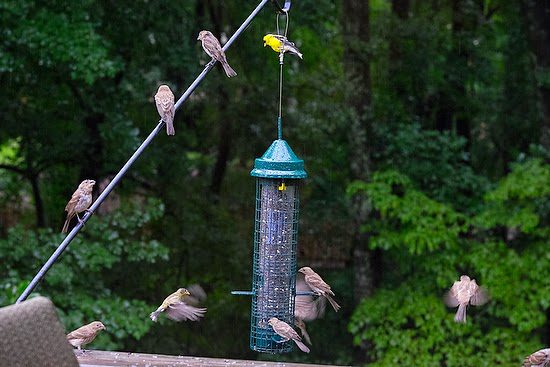| Fuji X-E2, 55-200mm, ISO 6400, ƒ/7.1, 1/125, EV -1.7 |
My bird feeders are teaching me a great deal these days. Of course, the feeder doesn’t change daily, but the light and the birds do.
This past weekend I observed we had a lot of fledglings. Fledge is the stage in a young bird’s life when the feathers and wing muscles are sufficiently developed for flight. It also describes the act of a chick’s parents raising it to a fully grown state.
Here I watched the House Finch feeding the Fledgling. It was just fun watching this take place, and so I decided I would pull out the cameras and photograph them. Again, the combining of one interest with another enhances the experience.
When I started, the photos were overexposed. This overexposing is because I was shooting in aperture mode. I had Auto ISO chosen with a minimum shutter speed setting of 1/500. I compensated for the exposure by turning the EV to -1.7 and would fine-tune it here and there based on the histogram.
The Fujinon XF 55-200mm was pretty slow with a ƒ/3.5-4.8 aperture. I was getting pretty good results, but we had rain coming down most of the weekend, and I thought this was a great time to test the new Sigma 120-300mm ƒ/2.8.
With the Red Bellied Woodpecker, I was not having to use the exposure value compensation and got great detail in the feathers.
 |
| Nikon D4, Sigma 120-300mm f/2.8 DG OS HSM Lens + Sigma 1.4 converter, ISO 4500, ƒ/6.3, 1/500 EV -1.3 |
However, when the darker Downy Woodpecker visited the feeder, I had to compensate the EV -1.3.
I was having fun, and the thing is, while I was having fun, I was also learning how to check the exposure from bird to bird because that would affect the direction. I could have tried the manual exposure, but the light was changing as the sun would peek through a little and then disappear.
I also enjoyed shooting with the faster ƒ/2.8. I was able to add the Sigma 1.4 converter when I photographed the Downy Woodpecker and got just a little closer to 420mm.
I was also learning about the birds. I downloaded Peterson’s guide to my iPad and enjoyed finding out the names of the birds. For example, at first thought, I had a Hairy Woodpecker, but that is a bigger bird with a longer bill.
Taking photographs allowed me to have the time to zoom in and examine the bird in detail. But, unfortunately, too often, they come and go on the bird feeder too quickly for me to study.
Now you know why so many birders are also photographers. The photos give you a long time to examine the bird.
Do you have something you can photograph regularly, see how your camera reacts in a different light, and also help you grow? If not, I recommend you look. I found mine in my backyard.



